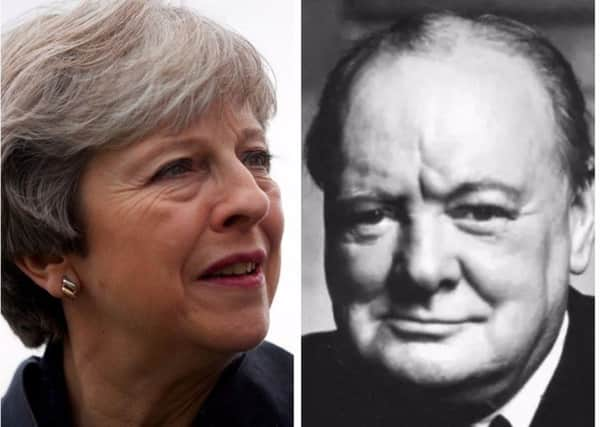'˜May must reach out if she wants to win Brexit battle'


I am reminded of this by David Owen’s book Cabinet’s Finest Hour, an account of the handling of the run-up to Britain’s darkest hour, with the Dunkirk evacuation in 1940.
Owen, a former Foreign Secretary, argues that underlying Cabinet government is a recognition of the value of a collective approach and the weaknesses of unbridled power. Winston Churchill, he maintains, deepened democracy during the war by not trying to bypass either Cabinet or Parliament, and that this is a lesson for today.
Advertisement
Hide AdAdvertisement
Hide AdOf course, people will argue that today we are not – or not yet – faced with the evil of Nazism and that Owen has no room to talk, bearing in mind his defection from Labour and the trials of his new Social Democratic Party. Indeed, there are people who would argue that Owen would only be happy running his own government of one.
But let us not be cynical or churlish. Even allowing for television’s focus on the leader, Owen undoubtedly has a point in the presidential style of government practised by Tony Blair and David Cameron – Blair with his sofa government that took us to war under false pretences and Cameron, with his old Etonian cabal.
You might argue that the divisive Margaret Thatcher was never primus inter pares either. There you would be wrong. She had Churchill’s respect for Cabinet and Parliament even though she could probably never rely on any of her Cabinets’ support had she resorted to votes – and not just because of her tactlessness. In any case, William Whitelaw served as a corrective. If Willie could wear it, then so should the rest – as they generally did.
The Westland affair was an exception. But what else was it about if not to maintain the integrity of Cabinet government against Michael Heseltine’s flaunted ambition? The Cabinet felt that the helicopter company should seek its own salvation. When Heseltine was told to observe collective responsibility – he wanted Westland to be subsumed in a non-existent European consortium – he walked out into a wilderness of his self-seeking.
Advertisement
Hide AdAdvertisement
Hide AdOwen makes a plea for a return to the old values of government when, in the face of the greatest peril this country has ever faced, Churchill not only informed but also advanced Cabinet government.
I have much sympathy with his argument, though the prospect of Labour under Jeremy Corbyn making common cause with the Tories is so improbable as to invite derision.
In any case, we are not at war, if you ignore Islamic terrorism, Russian probing, rising crime and a mislaid, if not irretrievably lost, public service ethic at home.
This brings us to Theresa May who, like Blair and Cameron, went wrong – she under the tutelage of two unelected advisers. She allowed them to get above themselves, leaving her in the limbo of uncertainty caused by a loss of her overall majority and Cabinet coherence.
Advertisement
Hide AdAdvertisement
Hide AdWhile co-ordination has been improved since the June election, it is far from a cohesive government. Mrs May is too often portrayed slapping her senior ministers down, especially over Brexit, which is likely to dominate politics for another 18 months.
If she is to change the popular perception of herself as a leader who goes hiking with her husband and decides policy on the hoof, she will have to change, too. I am not pretending that leading Chancellor Philip Hammond, Foreign Secretary Boris Johnson, Home Secretary Amber Rudd and Brexit Secretary, David Davis, is easy. They are, to say the least, a curious lot.
But one of the functions of a party leader is to manage the awkward squad and generally drive things forward with carefully orchestrated collective support.
In every crisis lies an opportunity. And Mrs May now has the opportunity as she tries to secure a clean break from the European Union to provide informed and collective responsibility through the Cabinet.
Advertisement
Hide AdAdvertisement
Hide AdThat will be best achieved by her reaching out to her Cabinet, parliamentary party, rank and file and the people through a manifest determination to enhance government cohesion.
That always assumes the Tories have any sense left in their boneheads. But Churchill reconciled – or kept on board – the appeasers. If, faced with the prospect of invasion by Hitler, he could do it, Mrs May should surely be able to rally the troops in the face of Brexit.
David Owen is right. She must.
Read Bernard Ingham every Wednesday
Read more: